
We were close to Helgoland. Our small brig, "The Seagull",
was in good shape and was plunging her prow busily up and down into the water. I sat down on the yardarm of the afterdeck and took firm hold of my accordeon, from which I was by now able to extract a few melodies. (Up to then, I had had to make do with a comb for my music, not having had this fine instrument.) I put my fingers on the keyboard: "La Paloma", the white dove ...! - and the ocean stamped out the rhythm for me. But heaven knows, I didn't manage to get anything much out of that sailor's piano. Why was that so? I wasn't really concentrating; I was preoccupied with other things which distracted me. Some thoughts which returned again and again took on visual form - they took shape in my imagination: huge fish, sea monsters, kobolds and pirates. 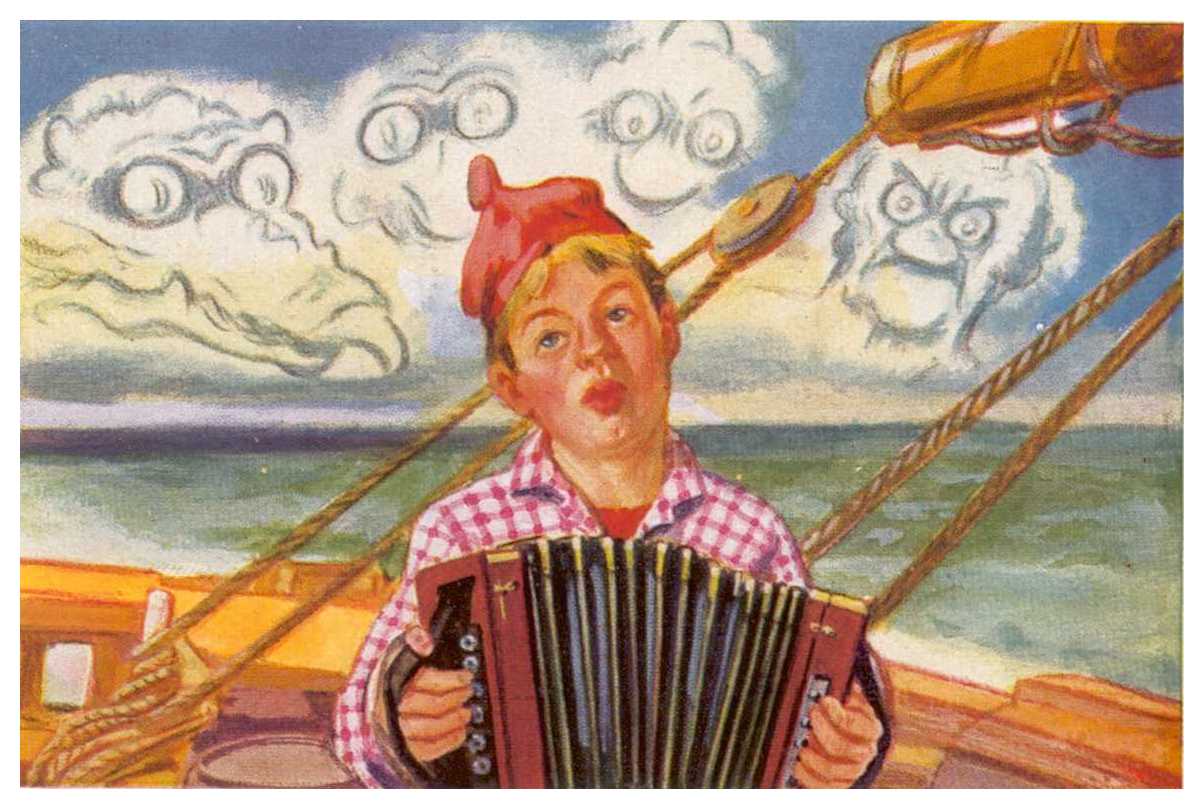 Among all these apparitions there was one dominant image: the face of our captain's spouse, our old fellow's wife. It looked angry; it became clearer and ever more threatening; it turned into a real shark's mug and finally ended up looking like a caricature of an ante-diluvian animal. I rubbed my eyes. There was an oppressive atmosphere everywhere. The masts creaked and the wind whistled so strangely in the rigging that I became very frightened. Something uncanny was brewing. Was our ship rolling? I looked around: the wash was foaming and gurgling. I couldn't bear it any longer. I laid my instrument aside and dashed towards the cabin stairs. Smutje, the ship's cook, was just making his way up, panting. I wasn't such a fool as to speak of the vision I had just had. "Is there something wrong on board?" I asked hastily and without thinking. He just gave me a dirty look and needless to say didn't think it necessary to answer a mere lad like myself. But immediately afterwards I heard him call up to the mate: "Hey, Kasper Kolnkarken, look out! is everything alright?" Sailors are superstitious; the sea turns them into credulous children who believe in miracles. The mate grunted and said nothing further. But after a short interval he came back to it. Kuddel Bodderbrod, Edje Garn, Jonny Schwarz and Willem Koppersmid, stalwart lads all, were standing to the right near the railing. They had pipes in their mouths, their hands in their pockets, and were whispering to each other. So something was amiss. "Look out! Is everything alright?" cried the mate. The four sailors looked around, and exchanged glances, wondering what to make of that. Then they went off towards the ship's bow, where our bigwig Krischan Smoken was, as usual, talking philosophy with Hein Quast. I had observed what was going on, and now saw the five of them get into a conspiratorial huddle. -
Among all these apparitions there was one dominant image: the face of our captain's spouse, our old fellow's wife. It looked angry; it became clearer and ever more threatening; it turned into a real shark's mug and finally ended up looking like a caricature of an ante-diluvian animal. I rubbed my eyes. There was an oppressive atmosphere everywhere. The masts creaked and the wind whistled so strangely in the rigging that I became very frightened. Something uncanny was brewing. Was our ship rolling? I looked around: the wash was foaming and gurgling. I couldn't bear it any longer. I laid my instrument aside and dashed towards the cabin stairs. Smutje, the ship's cook, was just making his way up, panting. I wasn't such a fool as to speak of the vision I had just had. "Is there something wrong on board?" I asked hastily and without thinking. He just gave me a dirty look and needless to say didn't think it necessary to answer a mere lad like myself. But immediately afterwards I heard him call up to the mate: "Hey, Kasper Kolnkarken, look out! is everything alright?" Sailors are superstitious; the sea turns them into credulous children who believe in miracles. The mate grunted and said nothing further. But after a short interval he came back to it. Kuddel Bodderbrod, Edje Garn, Jonny Schwarz and Willem Koppersmid, stalwart lads all, were standing to the right near the railing. They had pipes in their mouths, their hands in their pockets, and were whispering to each other. So something was amiss. "Look out! Is everything alright?" cried the mate. The four sailors looked around, and exchanged glances, wondering what to make of that. Then they went off towards the ship's bow, where our bigwig Krischan Smoken was, as usual, talking philosophy with Hein Quast. I had observed what was going on, and now saw the five of them get into a conspiratorial huddle. -
I do not know much about writing: that is not my trade. I am a ship's boy, but even so, I will do my best to record my experience. But it was so extraordinary that, being now ashore and once again in possession of my senses, I find it hard to muster the courage to write down a true record of what happened, since it now seems downright unnatural to me. But I shall attempt it, just the same. So I shall continue and make it short and to the point. -
Conditions on boards were not exactly the best. Our Captain Flint had his head back to front, that is to say that he was forever turning round to sound out whether "Ma Plops" was on his heels. "Ma Plops" was his lawfully wedded wife, who put the fear of God into him. She accompanied him on every voyage. Captain Flint, however, claimed that he towed her along, as he put it. But that was not really so - it was she who brought him along. It was she, and she alone, who was in command of our brig. She didn't have the formal papers such as a sailor's training certificate or captain's patent - had she had these, then our poor captain would have been quite superfluous. That was why Captain Flint's distress at his loss of authority often led him to look rather too deeply into his glass of grog. The appelation "Ma Plops" was of course a nickname which the crew had aptly thought up for their second, or rather first captain. For she plopped into all matters which were really only sailors' business; she stuck her nose into everything and claimed to know more about seefaring and navigation than all of us put together. Nor was she good-looking. Her figure rather resembled a large bell; her nose was wide and had a downward curve like a cobbler's thumb; she had eyes just like a shellfish. Lora, the green parrot that she adored, spent most of the time perched on her shoulder.
I must go a long way back in my story. If I am to describe the experience of my second journey, then I also have to speak of my first one, as both are closely linked. In the summer of 1862, we were sailing from Rotterdam to Cape Town with a cargo of salt. 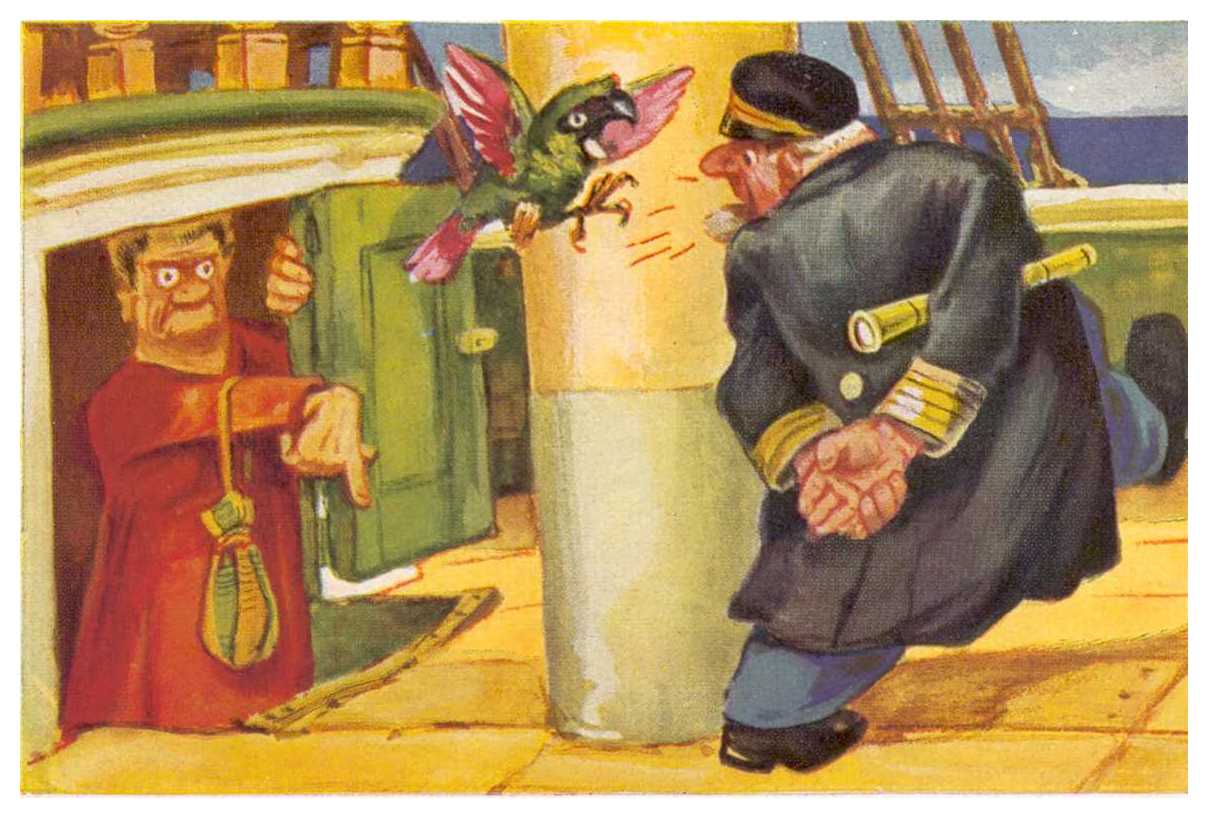 Instead of reaching the southern coast of Africa, we ended up in the Indian Ocean due to the navigation skills of "Ma Plops", who of course would never brook contradiction. We were soon at our wits' end. And there was worse to come. To complete our misfortunes, our ship was becalmed, and for almost three weeks the sails of our brig hung like plumb lines or like the curtains of a parlour. The unusual sight of the smooth and glassy surface of the endless water filled us with feverish impatience and almost drove us to madness. In the face of this catastrophe, a terrible row arose one day. For the first time ever, I saw our Captain Flint really let loose. His anger had been simmering inside him for some time, and now it broke out. We saw sparks and stars fly. In his blind rage, he tore his wife's capacious knitting bag out of her hands - she was given to hiding special books and secret plans in it, which had led her completely astray this time in her high-handedness - and he sent them flying overboard into the Indian Ocean.
Instead of reaching the southern coast of Africa, we ended up in the Indian Ocean due to the navigation skills of "Ma Plops", who of course would never brook contradiction. We were soon at our wits' end. And there was worse to come. To complete our misfortunes, our ship was becalmed, and for almost three weeks the sails of our brig hung like plumb lines or like the curtains of a parlour. The unusual sight of the smooth and glassy surface of the endless water filled us with feverish impatience and almost drove us to madness. In the face of this catastrophe, a terrible row arose one day. For the first time ever, I saw our Captain Flint really let loose. His anger had been simmering inside him for some time, and now it broke out. We saw sparks and stars fly. In his blind rage, he tore his wife's capacious knitting bag out of her hands - she was given to hiding special books and secret plans in it, which had led her completely astray this time in her high-handedness - and he sent them flying overboard into the Indian Ocean.
With this account of the unforgettable action taken by our captain (which was to have serious consequences), I shall break off the story of my first voyage in order to take up where I left off. Helgoland was long since out of sight. Now we were out on the open sea. It terrified me this time, and with a heavy heart I calculated the number of days it would take us to reach Kristianssand, our next port-of-call. 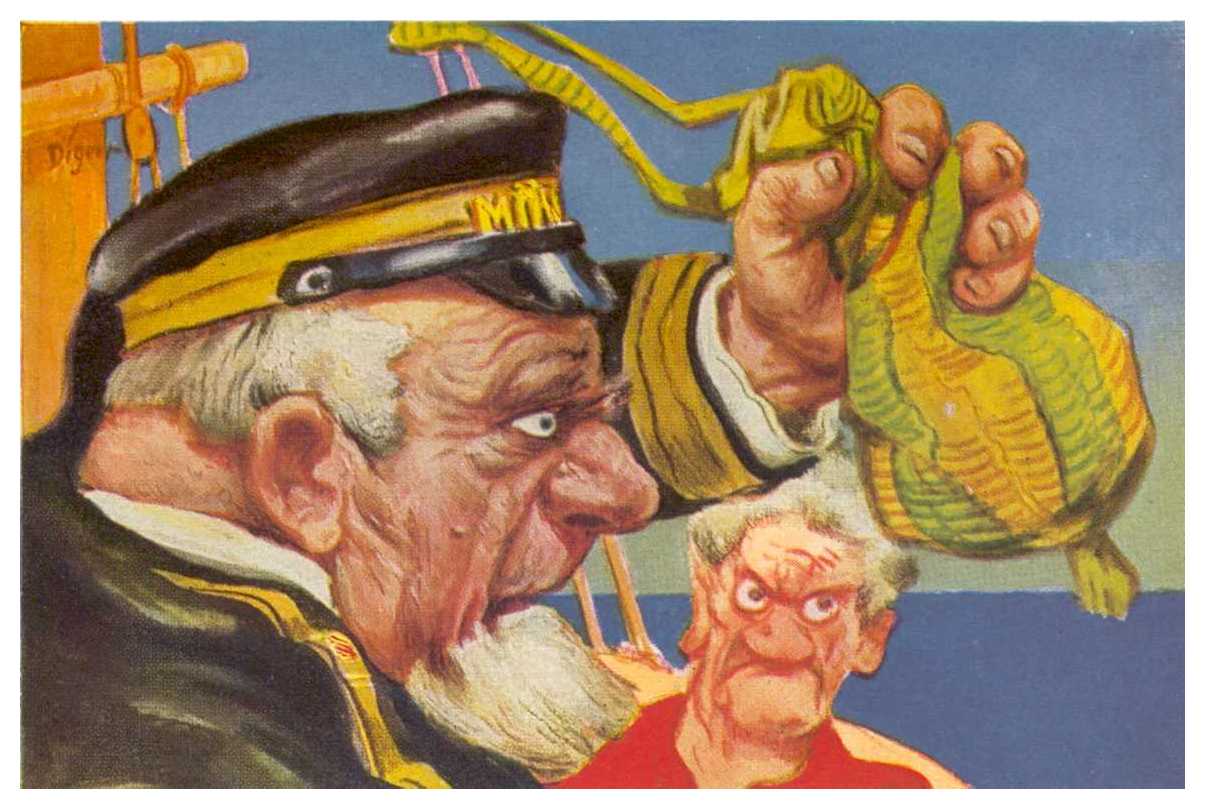 The oppressive atmosphere that I described at the beginning was now even more evident. The hasty question I had put to the ship's cook whether something was wrong had been passed on from one sailor to the next. It was justified in so far as something was indeed wrong. But what? The crew were still standing around together whispering when the shuffling steps of our captain became audible through the planks underneath in the galley. They were approaching the stairs and he soon appeared himself on deck. Let me say here that Captain Flint was a fine chap who treated us tars as his equals. As soon as he came in sight I could see from his face that he was extremely worried. "Lads, let's talk man to man!" he began, walking towards his crew. "Superstition is not in our programme, but we do seem to have something like the seven devils or a kobold on board, my...!" Just then his wife appeared like an oncoming storm on the bridge behind him, her arms raised, her hair in disorder. She cut him short so that his word literally stuck in his throat. While he coughed and wheezed, a flood of curses rained down from above.
The oppressive atmosphere that I described at the beginning was now even more evident. The hasty question I had put to the ship's cook whether something was wrong had been passed on from one sailor to the next. It was justified in so far as something was indeed wrong. But what? The crew were still standing around together whispering when the shuffling steps of our captain became audible through the planks underneath in the galley. They were approaching the stairs and he soon appeared himself on deck. Let me say here that Captain Flint was a fine chap who treated us tars as his equals. As soon as he came in sight I could see from his face that he was extremely worried. "Lads, let's talk man to man!" he began, walking towards his crew. "Superstition is not in our programme, but we do seem to have something like the seven devils or a kobold on board, my...!" Just then his wife appeared like an oncoming storm on the bridge behind him, her arms raised, her hair in disorder. She cut him short so that his word literally stuck in his throat. While he coughed and wheezed, a flood of curses rained down from above.
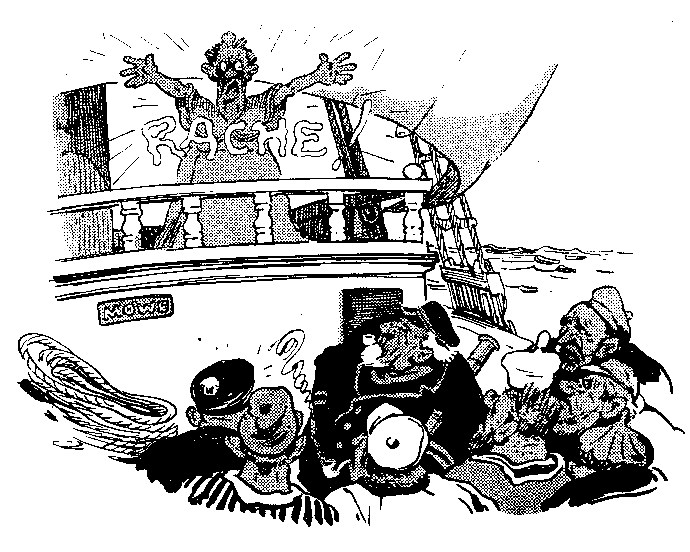 - "Haaa -
vengeance! Haaa - amends! - Rrrrevenge! Providence will avenge me! - Haaa! Be prepared! 'The Seagull' will go down with all hands! - Tonight, yes tonight your doom will come!"
- "Haaa -
vengeance! Haaa - amends! - Rrrrevenge! Providence will avenge me! - Haaa! Be prepared! 'The Seagull' will go down with all hands! - Tonight, yes tonight your doom will come!"
- "Why so?" Krischan Smoken had the temerity to ask.
- " Why so? No creature can live without a soul, nor can 'The Seagull'! Her soul is lying far from here deep down at the bottom of the Indian Ocean! She is sailing along, soulless and helpless, and tonight she will sink!"
- "Truly learned! So what do we do?" muttered Kuddel Bodderbrod.
- "You can thank your Captain for this! He did a dastardly deed in flinging my knitting bag into the sea - it contained the soul of our brig wrapped up in old documents and secret ship's papers. Haaa - vengeance! Rrrrevenge!" Ma Plops shrieked like a diving seagull, and sent icy shivers down our spines. For a while there was a deathly silence. Then Edje Garn said:
- "That's what's being said since Hamburg; now we're in a pretty pickle!"
- "Let me go ashore - all this perpetual commotion!" grumbled Hein Quast.
Jonny Schwarz tore his cap from his unkempt hair and threw it down on to the ground:
- "That's harrassment!"
- "Hmmn, that's what happens when the devil is among the company!" replied Willem Koppersmid.
- "For heavens' sake and damn it again!" they muttered left and right. Captain Flint alone said ne'er a word. He had a desperate expression on his face, and when he went off his posture indicated what a sense of guilt he felt towards us.
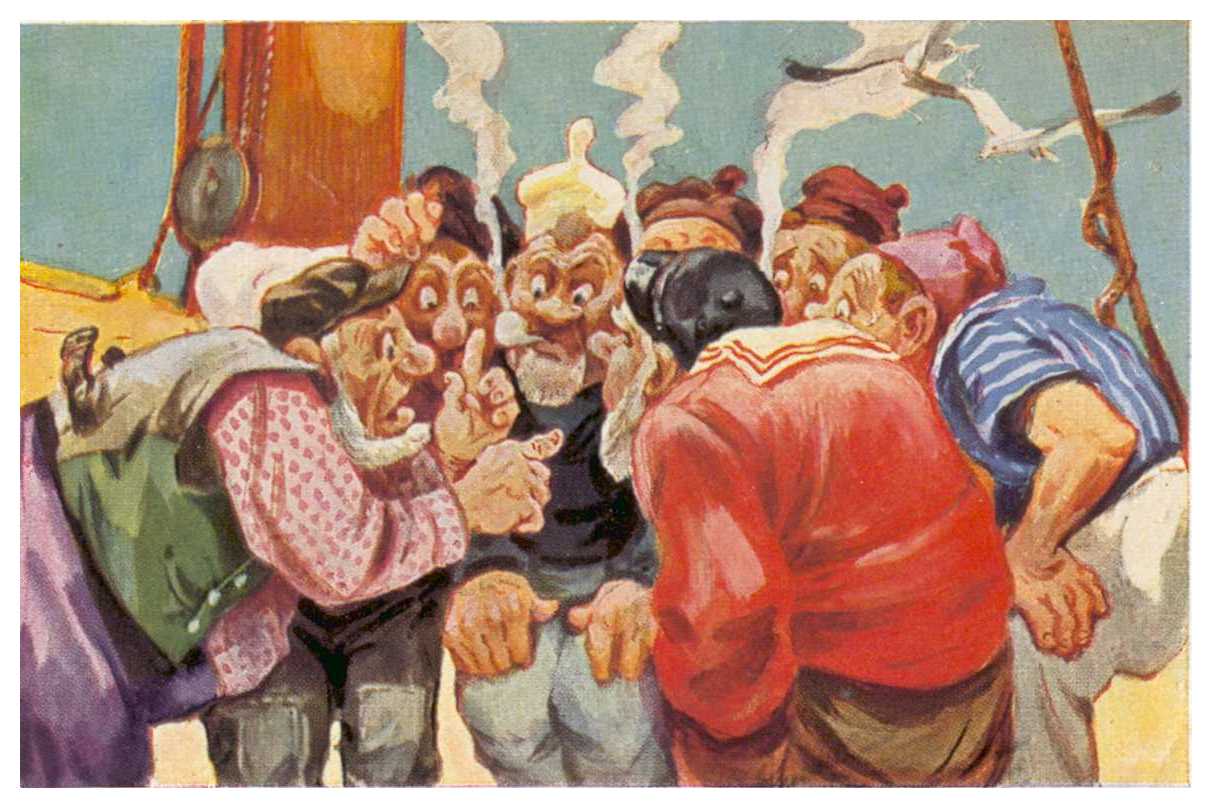 Evening had come in the meantime. The water was flowing indolently by; one could imagine that it wasn't October on the North Sea but the end of the day after a hot midday somewhere in southern waters. Our ship was lying in the swell with very little wind. We had finished our work and were sitting together on the afterdeck. But nobody had any real desire to chat not to mind laugh - everybody sat there pensively. Edje Garn spat overboard and was the first to break the silence in expressing the rest of his thoughts aloud:
Evening had come in the meantime. The water was flowing indolently by; one could imagine that it wasn't October on the North Sea but the end of the day after a hot midday somewhere in southern waters. Our ship was lying in the swell with very little wind. We had finished our work and were sitting together on the afterdeck. But nobody had any real desire to chat not to mind laugh - everybody sat there pensively. Edje Garn spat overboard and was the first to break the silence in expressing the rest of his thoughts aloud:
"...Well! Really can't believe that!" - Hein Quast, our philosopher, intervened at once: "Distance doesn't exist for the soul; only for the knitting bag: that is made of heavy material of course."
- " What was that, Hein?" asked Jonny Schwarz, "out with it!"
- "That's right, Hein Quast, begin at the beginning, but clearly and simply!"
- "Wait a moment!" Krischan Smoken asked for silence: "I want to tell you what our Captain once said to me in a moment of weakness. Well, those secret documents, construction papers and launch papers with big ribbons - that's all true! And there was also a tallerman or a talisman, or whatever they call those things, a seal with an ornamented tin frame and on that was written:
The Seagull has a mighty long boom,
But without myself she must meet her doom.
Hein Quast remarked: "That's true; there are things between heaven and earth that our schoolmasters don't want to hear about!"
- "You should say: ... more things than are dreamt of down here!"
Bodderbrod interrupted.
"What's the difference?" Hein Quast raised his voice; it annoyed him to be corrected: "What matter anyway whether you end up sooner or later in the water - that's the sailor's fate and we are sailors after all, aren't we!" -
A strong gust of wind made us all look up that came like a flash of lightening out of the blue. Dark clouds had come up from the east without our noticing which were moving along the horizon like black towels flapping in the gale. In just a few minutes it had become pitch dark. "Egyptian darkness!" cried Kolnkarken from above and took hold of the wheel. "You'd better say 'Indian darkness' - that would be more like it!" answered Krischan. But we were soon to lose our sense of humour. We barely had time to light a lamp before the storm broke, the ferocity of which was such that it even filled the storm-tried sailor hearts of our crew with fear and superstitious terror. We had all lost our heads. Kasper Kolnkarken gave orders to himself at the wheel: "North - north - west - 2 west - - -!" But our Captain Flint appeared suddenly and thundered amid the confusion in a stentorian voice: "Moor! hurry!" - "Don't make such a noise, will you!" Oh dear: "Ma Plops" had also arrived and sent our captain into the galley. Now we were all lost. Huge breakers, mountains of water black as ebony rolled towards us. The storm raged like a hurricane. Ropes and broken yards were being swept overboard like chaff in the wind.
I ran down the stairs to report to Captain Flint, stuck my head through the flap of his cabin door and saw Captain Flint holding on for dear life and trying to make himself a grog. "Captain, a huge tub is approaching us astern with big yellow lights...!" - "Out of the question, boy. Windward and leeward are always red and green!" - "Captain, should we sail up to it and let them take us on board? We will be lost otherwise!"
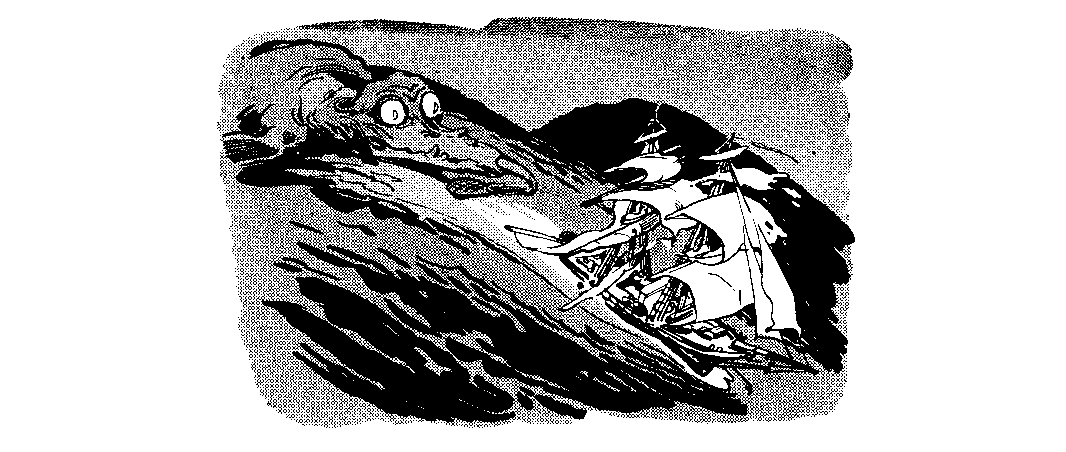
Without waiting for his reply, I ran up on deck again to see whether the the unknown ship had sailed closer. My limbs were almost paralysed with the fright. It was quite close and had changed into a colossal menacing monster with glowing eyes which was following in our wake at a speed of about 50 knots. 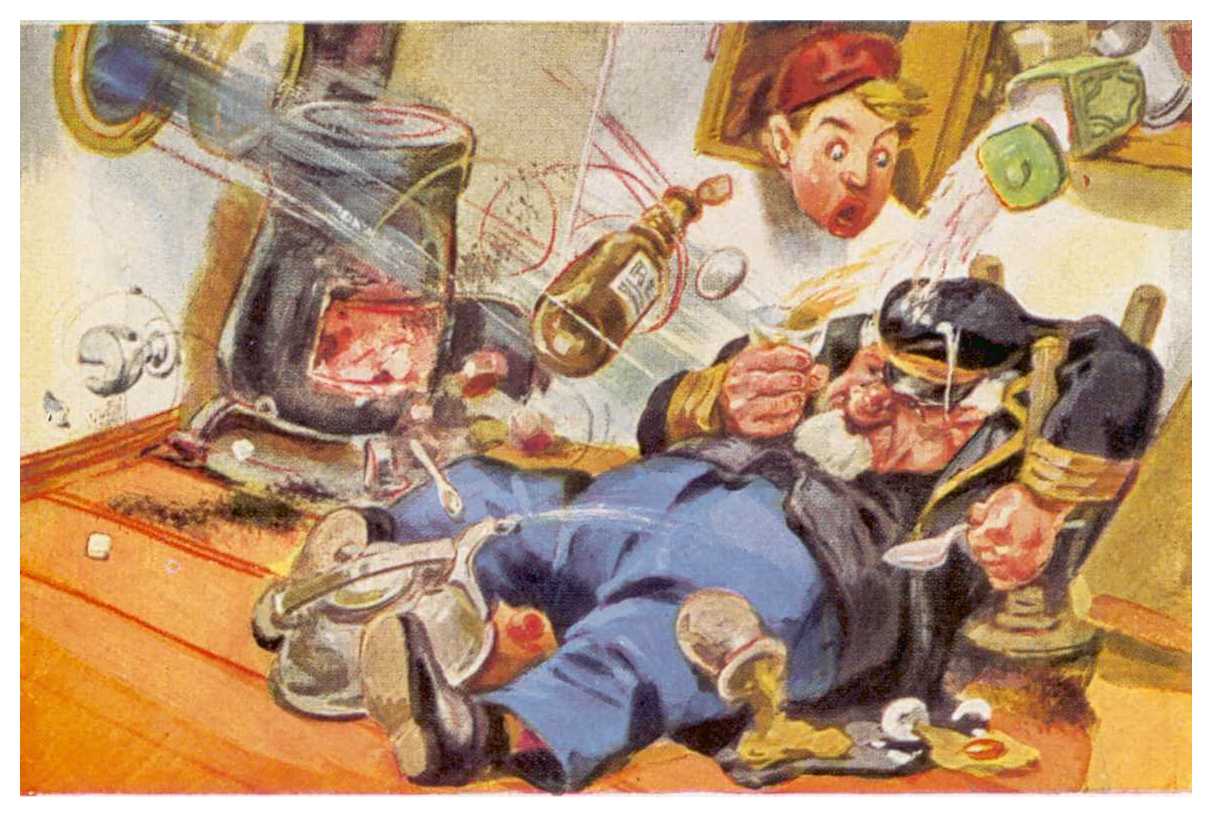 I raced down again, my heart beating like a sledgehammer, stuck my head through the flap and cried: "Captain, a huge sea monster...!" - "Lad, no such thing; there is no sea monster is in our book." Captain Flint was sitting in the midst of the most devastating disorder drinking grog. His face was covered in soot. Hot coals had fallen out of the stove and were rolling from one end of the cabin to the other. The sugar bowl, mustard, broken glasses, rubble and ashes - everything was rolling around. "Captain, a sea monster!" I stammered again and, trembling with fear, rushed up the stairs once more. There I saw a sight which I shall never forget as long as I live. Illuminated by a strange sulphurous yellow light, the ghastly monster was sitting on the stern of our ship: a plucked fowl of unimaginable dimensions, slapping its wing-like fins on the planks of the deck. One could hardly bear to look into the yellow plate-sized eyes, so strong was their fiery glow. In its crocodile's throat, which was more like an enormous duck's bill, it was holding something dark formed like a knitting bag. "Ma Plops" was standing in front of this phantom, her parrot on her shoulder, arguing in a loud voice. I looked around for help. Not a single soul was to be seen: not one member of our crew.
I raced down again, my heart beating like a sledgehammer, stuck my head through the flap and cried: "Captain, a huge sea monster...!" - "Lad, no such thing; there is no sea monster is in our book." Captain Flint was sitting in the midst of the most devastating disorder drinking grog. His face was covered in soot. Hot coals had fallen out of the stove and were rolling from one end of the cabin to the other. The sugar bowl, mustard, broken glasses, rubble and ashes - everything was rolling around. "Captain, a sea monster!" I stammered again and, trembling with fear, rushed up the stairs once more. There I saw a sight which I shall never forget as long as I live. Illuminated by a strange sulphurous yellow light, the ghastly monster was sitting on the stern of our ship: a plucked fowl of unimaginable dimensions, slapping its wing-like fins on the planks of the deck. One could hardly bear to look into the yellow plate-sized eyes, so strong was their fiery glow. In its crocodile's throat, which was more like an enormous duck's bill, it was holding something dark formed like a knitting bag. "Ma Plops" was standing in front of this phantom, her parrot on her shoulder, arguing in a loud voice. I looked around for help. Not a single soul was to be seen: not one member of our crew.
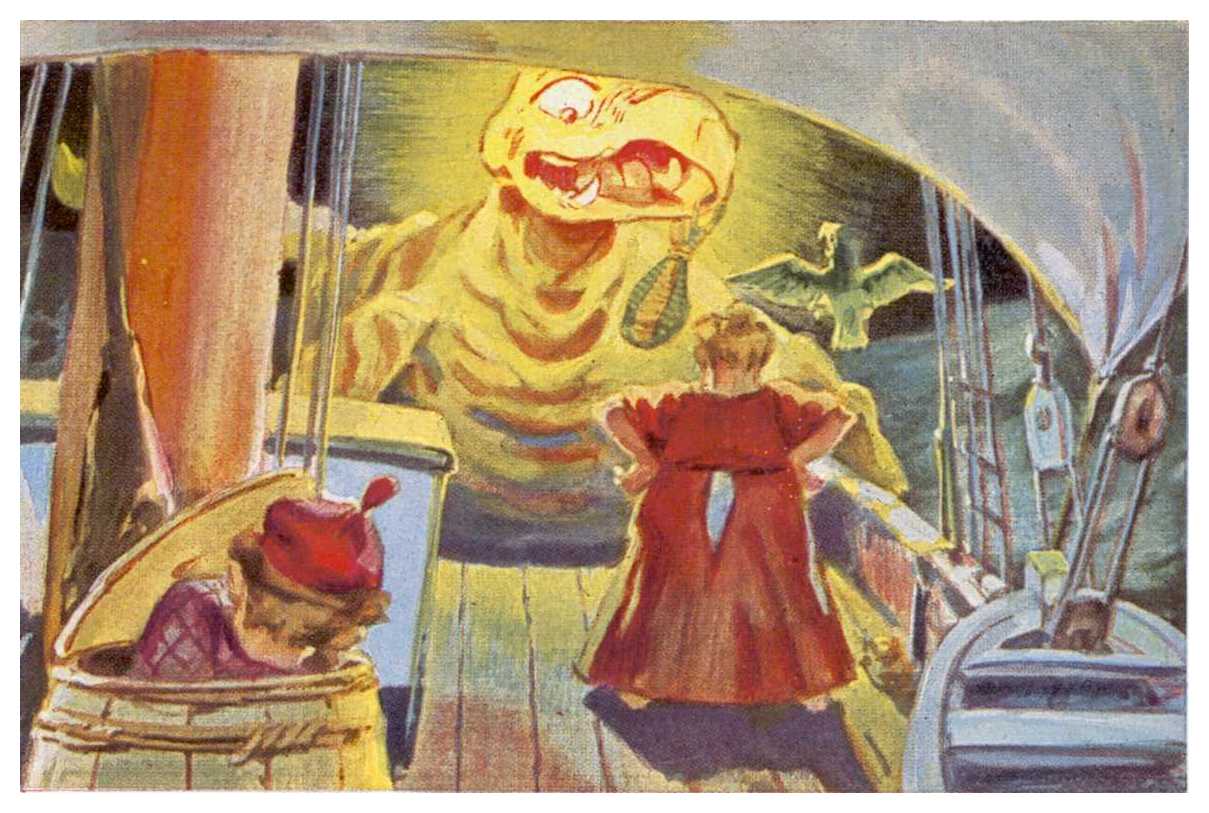 Suddenly the parrot gave a screech. In one bound I jumped into the empty water barrel, letting the cover close over my head. In my mind's eye I could see "Ma Plops" together with her parrot disappearing down the monster's throat. I pushed out the bung and looked out through the bunghole. Again I heard the parrot give a loud screech; then I saw the huge sea dragon get frightened by the croaking sound, drop the knitting bag and plop down from the stern into the water. I heaved a sigh of relief and wanted to leave my narrow refuge, but my strength abandoned me. An overpowering tiredness took hold of me. I fell asleep in the barrel. When I woke up it was morning: it was bright and the storm had spent itself. Captain Flint was standing in front of my barrel, his face still black with soot and coal-dust: "Lad, tell me now - what happened last night?" he asked in his deep bass voice. "Captain, that ante-diluvian sea monster gave our brig back her soul which it found in the knitting bag at the bottom of the Indian Ocean...!" I got no further. Captain Flint laughed and laughed until my ears were ringing. But all at once his laughter became shrill and broke off abruptly. "What was wrong now?!" I looked around in consternation: - there! Standing there behind us was "Ma Plops", her head held high and a triumphant expression on her face. The knitting bag was hanging from her arm. When I saw the knitting bag, the disappearance of which had given rise to so much fear and mortal agony, I took a deep breath and cried out in joy. I broke out in loud laughter (perhaps somewhat too loud for a ship's boy). The entire crew joined in howling and roaring. Our good "Seagull" sailed along through the water to the accompaniment of sailors' laughter.
Suddenly the parrot gave a screech. In one bound I jumped into the empty water barrel, letting the cover close over my head. In my mind's eye I could see "Ma Plops" together with her parrot disappearing down the monster's throat. I pushed out the bung and looked out through the bunghole. Again I heard the parrot give a loud screech; then I saw the huge sea dragon get frightened by the croaking sound, drop the knitting bag and plop down from the stern into the water. I heaved a sigh of relief and wanted to leave my narrow refuge, but my strength abandoned me. An overpowering tiredness took hold of me. I fell asleep in the barrel. When I woke up it was morning: it was bright and the storm had spent itself. Captain Flint was standing in front of my barrel, his face still black with soot and coal-dust: "Lad, tell me now - what happened last night?" he asked in his deep bass voice. "Captain, that ante-diluvian sea monster gave our brig back her soul which it found in the knitting bag at the bottom of the Indian Ocean...!" I got no further. Captain Flint laughed and laughed until my ears were ringing. But all at once his laughter became shrill and broke off abruptly. "What was wrong now?!" I looked around in consternation: - there! Standing there behind us was "Ma Plops", her head held high and a triumphant expression on her face. The knitting bag was hanging from her arm. When I saw the knitting bag, the disappearance of which had given rise to so much fear and mortal agony, I took a deep breath and cried out in joy. I broke out in loud laughter (perhaps somewhat too loud for a ship's boy). The entire crew joined in howling and roaring. Our good "Seagull" sailed along through the water to the accompaniment of sailors' laughter.
Now my spirits revived and my old love of seafaring re-awakened. I took up my accordeon and greeted the gleaming ocean. Now I was glad after all that we still had a few days' journey ahead before we reached Kristianssand. Jonny, the ship's boy.
